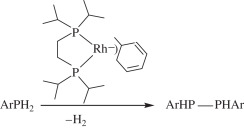
Bismuth’s history mirrors the ups and downs of the global economy. At present, amid economic struggles, organobismuth chemistry is on the rise, as showcased by Liam Ball’s investigations. His initial focus was on gold-catalysed techniques during his PhD, but his journey into bismuth chemistry commenced when a referee’s suggestion prompted him to delve into organobismuth pathways. Although he encountered several initial setbacks, this experience ignited his curiosity and unveiled previously unexplored opportunities for bismuth reactivity that had been dormant since the 1980s.
Bismuth’s role in organic chemistry began in the mid-19th century but was often eclipsed due to its perceived instability compared to other elements in group 15. The groundbreaking work by Derek Barton in the 1980s on organobismuth(V) attracted attention for oxidative transformations, but was later overshadowed by more efficient cross-coupling reactions. Nonetheless, bismuth’s low toxicity and affordability are rekindling interest in its distinctive reactivity, offering alternatives to challenging reactions that cannot be tackled with conventional methods.
Ball’s research is propelling bismuth chemistry forward with an emphasis on practicality and stability. His team has created a versatile bismacycle reagent from boronic acids, easing the transition to reactive bismuth(V) species. These bismuth(V) compounds, known for their electrophilic properties, enable unique transformations including arylation of phenols and diketones, which are particularly beneficial in agricultural contexts.
In partnership with Syngenta, Ball’s group has utilized bismuth reagents to fabricate essential elements of ACCase inhibitors, a category of herbicides historically reliant on lead reagents. They have also used the reagent for the O-arylation of pyridones, demonstrating novel selectivity and wide-ranging applicability across diverse substrates.
Despite facing challenges—chiefly the necessity for stoichiometric amounts of bismacycles—which raises sustainability issues, Ball draws motivation from analogous catalytic efforts, acknowledging that shifting to catalytic systems is a significant challenge.
Awarded the chemistry accolade at the 2025 UK Blavatnik Awards, Ball credits this achievement to the collective efforts of his team, technicians, collaborators, and sponsors. As Ball’s group marks its 10th anniversary, they persist in uncovering new possibilities for bismuth in synthetic chemistry, reinforcing its significance and expanding its applications.